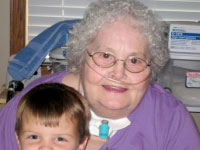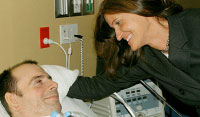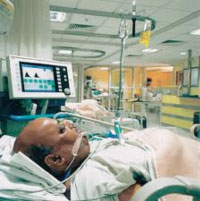Dialysis with a Trach or Vent
Do you or a loved one have a tracheostomy (known as a trach, an opening in the neck) or use a ventilator (vent) to breathe and need dialysis? If so, here are some things to think about.
Why might people who have trachs and use vents need dialysis?
With each normal breath, the diaphragm drops. This pulls air into the lungs. But if the lungs are very damaged, air must be pushed in to fill them. The extra pressure can reduce blood flow to kidneys. When kidneys get less blood than they need, this can cause kidney failure.
Where can people who use vents live?
 People who use vents can live in their own home, assisted living, or long-term care. If dialysis is needed too, it helps to find a place that offers both vent support and dialysis. This avoids the added burden of getting to and from dialysis.
People who use vents can live in their own home, assisted living, or long-term care. If dialysis is needed too, it helps to find a place that offers both vent support and dialysis. This avoids the added burden of getting to and from dialysis.
Places that offer vent care may not be nearby. So, often people who are alert but need to use a vent long-term want to be home. If family members are able and want to take a loved one home, they need to learn how to do respiratory care. This includes how to suction a trach and operate a vent. Having a loved one who can do respiratory care makes it possible for someone who needs a vent to live at home.
Will dialysis clinics take someone who has a trach or needs a ventilator?
Dialysis clinics may be afraid to admit someone who has a trach. They worry about how to care for the patient's special needs. Will the patient who has a trach get an infection or spread one to others? Will the busy nurse need to suction the trach? Is a bed needed, or will a dialysis chair work? Who would troubleshoot the vent during treatment if there is a problem? These fears may be reduced if a family member or hired nurse can come to the clinic to suction and do ventilator care.
Can someone who has a trach or uses a vent do home dialysis?
Yes. Most people do hemodialysis (HD) in a clinic. One or more trained helpers would need to do some or all of the dialysis and/or respiratory care tasks.
Can someone who needs a vent do PD?
 Some dialysis staff think that someone who needs a vent can only do HD. However, doctors who have cared for vent-dependent patients say they can do PD at home if the clinic has an experienced PD nurse and physician caring for them. It helps to have one or more trained dialysis helpers, too. The dialysis helper must be committed and willing to be on-site when the patient is on dialysis.
Some dialysis staff think that someone who needs a vent can only do HD. However, doctors who have cared for vent-dependent patients say they can do PD at home if the clinic has an experienced PD nurse and physician caring for them. It helps to have one or more trained dialysis helpers, too. The dialysis helper must be committed and willing to be on-site when the patient is on dialysis.
Those who have treated people who use vents at home say cycler PD is less of a burden for the helper. Just one PD connect and one disconnect are needed each day, plus alarms to respond to. If the patient needs more waste removal than cycler PD provides, using Icodextrin PD fluid during the day avoids a midday manual exchange./>
Who could help someone on a vent do home dialysis?
Almost anyone can be trained to do PD or home HD. Dialysis clinics can train family members or friends with no medical background if they are willing to learn. Training can be done in the clinic, or in the person's home on a case-by-case basis. Training in the home—if a clinic is willing to do so—could avoid the cost and hassle of bringing someone on a vent to the clinic for training.
Or, the home training nurse can review what a hired nurse or tech knows. If the nurse or tech knows dialysis, the home training nurse can teach clinic policies, how to use the machine, if different, and how to order supplies. The patient may not need to be present for all of the training.
What are sources of financial help for care at home?
 Medicare will not pay for someone to help do dialysis
or
respiratory care at home. Medicare assumes that a loved one will help for free. You may want to hire someone with training and experience to do home dialysis and respiratory care.
Medicare will not pay for someone to help do dialysis
or
respiratory care at home. Medicare assumes that a loved one will help for free. You may want to hire someone with training and experience to do home dialysis and respiratory care.
Some health insurance plans or long-term care policies do cover dialysis and respiratory care in the home. If someone has limited income and assets, Medicaid may help pay for some limited care in the home. The hospital financial counselor or dialysis social worker may be able to suggest places to turn for financial help.
Is it time for end of life decision-making?
 In some cases, people who are near death from another serious illness develop kidney failure. When that happens, it may be time to discuss what to expect from dialysis. Will it extend the patient's life and provide some quality, or will it just extend someone's suffering?
In some cases, people who are near death from another serious illness develop kidney failure. When that happens, it may be time to discuss what to expect from dialysis. Will it extend the patient's life and provide some quality, or will it just extend someone's suffering?
When the burdens of dialysis are likely to exceed its benefits, it may be time to opt for hospice care to allow a loved one to die a natural death with dignity. To learn more about end of life care for people with kidney disease, see the End of Life Coalition's site at KidneyEOL.org.
These resources may be helpful:

